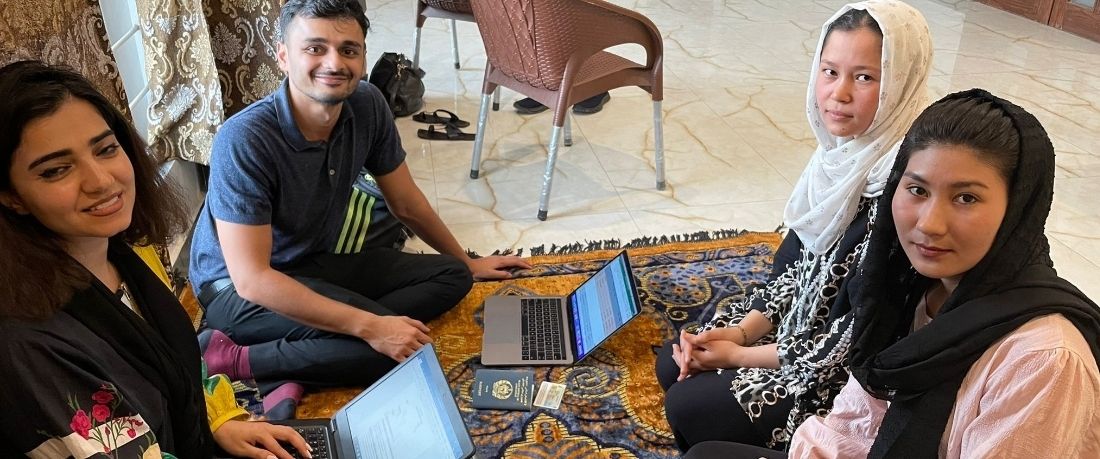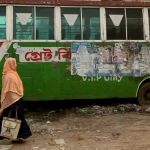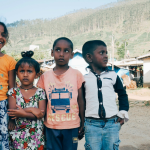Over two years after the Taliban took control over Afghanistan, iProbono’s response to the crisis offers lessons and key insights. As part of our People at Risk Program, my team and I worked to provide comprehensive care and legal support to a group of Afghan women cyclists, human rights defenders and their families. Forcibly displaced from their homes across Afghanistan, many members of our group of evacuees waited in limbo in Pakistan for nearly 10 months until they were able to travel to their new homes. For most of them, these were in Europe. During this time, we gained an understanding of the key challenges faced by the group through interviews conducted by our colleague Danyal Khan, a lawyer and Program Officer, who worked with Samaneh Nasiri, a graduate from the American University in Kabul and a member of our evacuee group. They used a survey created by Supriya Roychoudhury, our Research and Impact Director, for their conversations.
This article distils these interviews and long exchanges into six key challenges that I have shared below. Together, they offer insights into how organisations like ours can respond to crises. They answer questions like: What did we do right, and what could we do better? Most importantly, they offer a way to see how such responses can be shaped by the needs of the community, and how such programs can be developed to offer continued support.
Financial uncertainty: The lack of financial security emerged as the most crucial challenge faced by evacuees. Conversely, evacuees highlighted the need for continued financial support when asked about their/their family’s top priority needs. It was reported that there were delays in receiving funds from our team and food stipends, causing concern among evacuees who needed money to purchase medicines and other essentials not only for themselves but also for their parents. Under these circumstances, those evacuees who were able to draw on their own personal reserves or borrow from family members in Islamabad, did so. iProbono raised funds to pay for food, accommodation, visa fees, transport, and other basic costs of living.
Trauma and mental health issues: Several female cyclists reported that they were depressed. Having left their families behind in Afghanistan and not knowing what the future held for them were the primary causes of depression. Even though psycho-social care was made available to them, including a female psychiatrist on site, not everyone felt comfortable enough to use these services. One young female cyclist, for instance, stated that “I faced depression because the future was not clear. The doctor was here, but I personally preferred not to share my problems with her.”
Difficulties in transit: Several evacuees highlighted the challenges they faced enroute to Pakistan while crossing the various checkpoints. One group of four young female cyclists had a particularly harrowing encounter with the Taliban during their journey. Forced to conceal their identities as cyclists, they wore burqas and told the Taliban that they were going to Pakistan to receive medical treatment.
Separation of families and imminent risks to those left behind: The goal of the programme was primarily to support female cyclists and, where possible, family members also at risk. Most of the cyclists, however, were unable to bring their family members with them. Family members who have been left behind – government officials and administrators, tailors who stitched the uniforms of soldiers of the Afghan National Army, personnel of UN agencies, athletes, those belonging to minority ethnicities, security personnel at government buildings, and many other people – continue to face considerable risk in Afghanistan.
Highly variable (and gendered) resilience: Our data showed us that female evacuees had relatively fewer complaints compared to their male counterparts. Nearly 80% of those who reported to be ‘very satisfied’ with the services were women, indicating perhaps a greater degree of resilience, resourcefulness, and adaptability among them, compared to the male members of the group. As one of the female evacuees noted, “I observe myself as a lucky girl from Afghanistan to be evacuated and be part of this team.”
Appetite for continued learning and skill-building: As a group of predominantly professional cyclists, it is unsurprising that many reported the need to access a cycle to continue practising in Islamabad. In fact, this was a recurring response to the question about evacuees’ top priority needs. Another recurring response was the need to access English language classes and/or reading materials. Both responses indicate a strong appetite among evacuees to continue with their education, learning, and skill-building even during this period of hardship and extraordinary transition.
As a way to conclude this review, I would like to extend an invitation to hear from you. If you are an Afghan who was evacuated since 2021, or someone who is working to support Afghan communities in any of the jurisdictions where we work, please reach out and share your story. I hope these may lead to collaborations and more effective networks through which iProbono can provide dignified and useful support to Afghan people in all our communities.
Mariam Faruqi, Chief Executive Officer, iProbono.







